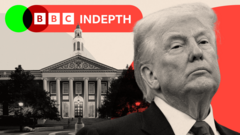In a sharp rebuke, Elon Musk has taken to social media to voice his strong opposition to President Donald Trump's massive tax and spending legislation, sparking discussions about intra-party divisions.
Musk Slams Trump's Tax and Spending Bill, Calls it 'Disgusting Abomination'

Musk Slams Trump's Tax and Spending Bill, Calls it 'Disgusting Abomination'
Elon Musk criticizes Trump's proposal, increasing rifts within the Republican Party.
Elon Musk has made headlines with his scathing criticism of President Donald Trump's tax and spending bill, labeling it a "disgusting abomination" in a post on X. The legislation, which has stirred significant controversy among Republicans, encompasses multi-trillion dollar tax cuts and escalated defense spending while raising the borrowing limit for the government.
Musk expressed his disapproval after Congress passed the bill in May, arguing that it contradicts the fiscal conservatism he previously advocated through his work leading the Doge, a group aimed at enhancing government efficiency. He has voiced repeated concerns that the proposed measures would deepen the national budget deficit by $600 billion in the next fiscal year, potentially ballooning it to $2.5 trillion.
Reflecting on the bill's implications, Musk described it as filled with "outrageous, pork-filled" spending that would leave American citizens with an unsustainable debt burden. The bill also aims to extend tax cuts from Trump's earlier administration and increase funds for military and immigration enforcement, alongside lifting the debt ceiling to $4 trillion.
Musk's comments have drawn attention not only for their intensity but also for the ongoing rift within the Republican Party. The bill has faced backlash from various party factions, and potential dissent has emerged in the Senate. Notably, Senator Rand Paul has indicated he would oppose the bill if it includes a debt ceiling increase, suggesting that Republicans may have difficulty uniting on the legislation.
Trump has responded aggressively to criticisms, particularly from Paul, emphasizing that misunderstandings of the bill's provisions could hurt the GOP's standing. Meanwhile, with a firm deadline set for a vote by July 4th, both Trump and Musk are navigating the complex political dynamics that could influence the future trajectory of the party and its spending agenda.
Musk expressed his disapproval after Congress passed the bill in May, arguing that it contradicts the fiscal conservatism he previously advocated through his work leading the Doge, a group aimed at enhancing government efficiency. He has voiced repeated concerns that the proposed measures would deepen the national budget deficit by $600 billion in the next fiscal year, potentially ballooning it to $2.5 trillion.
Reflecting on the bill's implications, Musk described it as filled with "outrageous, pork-filled" spending that would leave American citizens with an unsustainable debt burden. The bill also aims to extend tax cuts from Trump's earlier administration and increase funds for military and immigration enforcement, alongside lifting the debt ceiling to $4 trillion.
Musk's comments have drawn attention not only for their intensity but also for the ongoing rift within the Republican Party. The bill has faced backlash from various party factions, and potential dissent has emerged in the Senate. Notably, Senator Rand Paul has indicated he would oppose the bill if it includes a debt ceiling increase, suggesting that Republicans may have difficulty uniting on the legislation.
Trump has responded aggressively to criticisms, particularly from Paul, emphasizing that misunderstandings of the bill's provisions could hurt the GOP's standing. Meanwhile, with a firm deadline set for a vote by July 4th, both Trump and Musk are navigating the complex political dynamics that could influence the future trajectory of the party and its spending agenda.



















